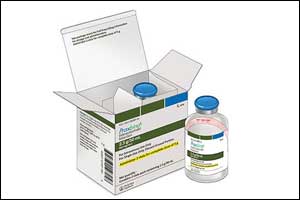- Home
- Editorial
- News
- Practice Guidelines
- Anesthesiology Guidelines
- Cancer Guidelines
- Cardiac Sciences Guidelines
- Critical Care Guidelines
- Dentistry Guidelines
- Dermatology Guidelines
- Diabetes and Endo Guidelines
- Diagnostics Guidelines
- ENT Guidelines
- Featured Practice Guidelines
- Gastroenterology Guidelines
- Geriatrics Guidelines
- Medicine Guidelines
- Nephrology Guidelines
- Neurosciences Guidelines
- Obs and Gynae Guidelines
- Ophthalmology Guidelines
- Orthopaedics Guidelines
- Paediatrics Guidelines
- Psychiatry Guidelines
- Pulmonology Guidelines
- Radiology Guidelines
- Surgery Guidelines
- Urology Guidelines
Praxbind (idarucizumab)-Specific reversal agent for Dabigatran approved

Praxbind (idarucizumab), the specific reversal agent for Pradaxa (dabigatran etexilate mesylate) received full approval by the U.S. Food and Drug Administration (FDA), as announced by the pharmaceutical company Boehringer Ingelheim. With this, Praxbind becomes the first and only specific reversal agent for a novel oral anticoagulant (NOAC) that has been approved by the FDA.
Praxbind is a monoclonal antibody that reverses the anti-coagulant effects of Pradaxa. It is indicated for the patients that have been administered with Dabigatran and need the reversal of its anticogulant effects in case of emergency surgery/urgent procedures or in life-threatening or uncontrolled bleeding.
Accelerated approval was already being granted to Praxbind by FDA in October 2015, based on the with results from the phase III RE-VERSE AD™ trial, the largest study to investigate a reversal agent for a NOAC. The final results of RE-VERSE AD were published in the New England Journal of Medicine in July 2017, and showed that Praxbind immediately reversed the anticoagulant effect of Pradaxa. The majority of patients had complete reversal of anticoagulation within four hours as measured by ecarin clotting time (ECT 82%) or diluted thrombin time (dTT 99%).In the RE-VERSE AD study, no adverse safety signals were observed and there was a low rate of thrombotic events. In clinical studies.
About Praxbind (idarucizumab)
Indications And Usage
Praxbind (idarucizumab) is indicated in patients treated with Pradaxa when reversal of the anticoagulant effects of dabigatran is needed:
- For emergency surgery/urgent procedures
- In life‐threatening or uncontrolled bleeding
Safety Information About Praxbind
Warning and Precaution
Thromboembolic Risk
- Dabigatran-treated patients have underlying diseases predisposing them to thromboembolic events. Reversing dabigatran therapy exposes patients to thrombotic risk. Consider resumption of anticoagulant therapy as soon as medically appropriate.
Re-elevation of Coagulation Parameters
- Elevated coagulation parameters (eg, activated partial thromboplastin time or ecarin clotting time) have been observed in a limited number of PRAXBIND-treated patients. If reappearance of clinically relevant bleeding together with elevated coagulation parameters is observed, or if patients requiring a second emergency surgery/urgent procedure have elevated coagulation parameters, an additional full dose may be considered.
Hypersensitivity Reactions
- There is insufficient clinical experience evaluating risk of hypersensitivity to idarucizumab, but a possible relationship could not be excluded. Risk of hypersensitivity (eg, anaphylactoid reaction) to idarucizumab or excipients needs to be weighed cautiously against the potential benefit. If serious allergic reaction occurs, immediately discontinue PRAXBIND and institute appropriate treatment.
Risk in Patients With Hereditary Fructose Intolerance
- PRAXBIND contains 4 g sorbitol as an excipient. When prescribing PRAXBIND in patients with hereditary fructose intolerance, consider the total daily amount of sorbitol/fructose consumption from all sources, as serious adverse reactions (eg, hypoglycemia, hypophosphatemia, metabolic acidosis, increase in uric acid, acute liver failure, and death) may occur.
ADVERSE REACTIONS
- The most frequently reported adverse reaction in ≥5% of idarucizumab-treated healthy volunteers was headache (5%). The most frequently reported adverse reactions in ≥5% of patients were constipation (7%) and nausea (5%).
- Treatment-emergent antibodies with low titers were observed in 4% of healthy subjects and 2% of patients treated with idarucizumab.
USE IN SPECIFIC POPULATIONS
Pregnancy and Lactation
- PRAXBIND should be given to a pregnant woman only if clearly needed. Caution should be exercised when PRAXBIND is administered to a nursing woman.
Boehringer Ingelheimcoagulationdabigatrandabigatran etexilate mesylatedrug inhibitorsFDAfda approvalFDA guidelinesidarucizumabmedicine guidelinespradaxapraxbindThrombosisthrombotic eventsU.S. Food and Drug Administrationuncontrollable bleeding
Next Story
NO DATA FOUND

Disclaimer: This site is primarily intended for healthcare professionals. Any content/information on this website does not replace the advice of medical and/or health professionals and should not be construed as medical/diagnostic advice/endorsement or prescription. Use of this site is subject to our terms of use, privacy policy, advertisement policy. © 2020 Minerva Medical Treatment Pvt Ltd